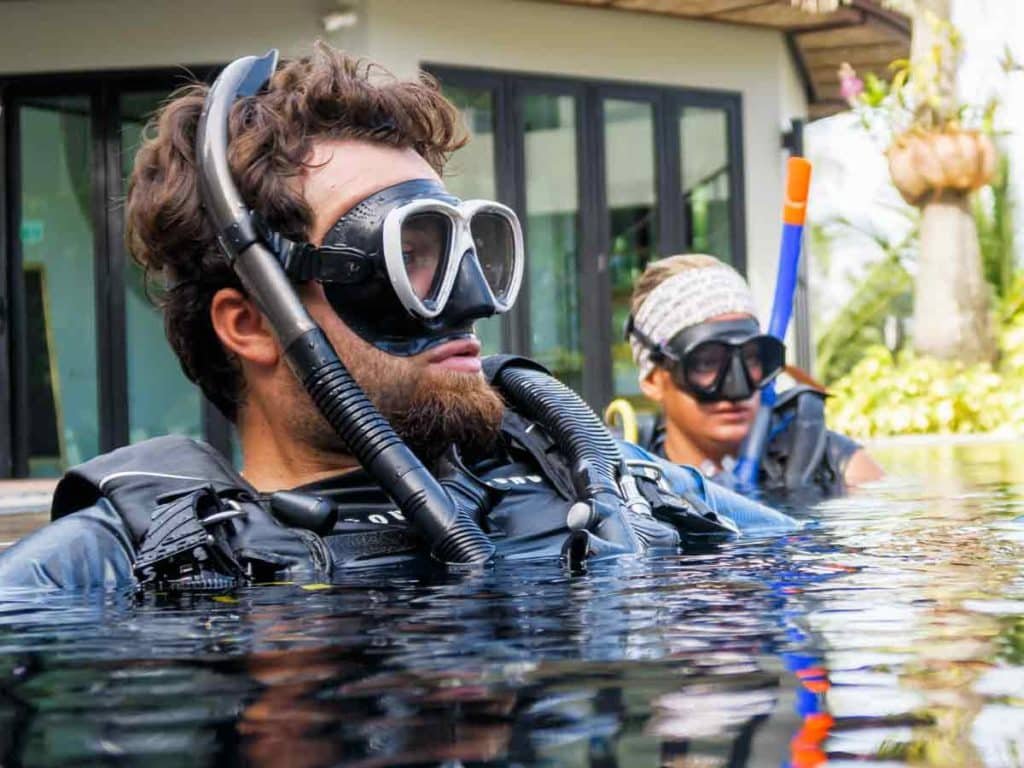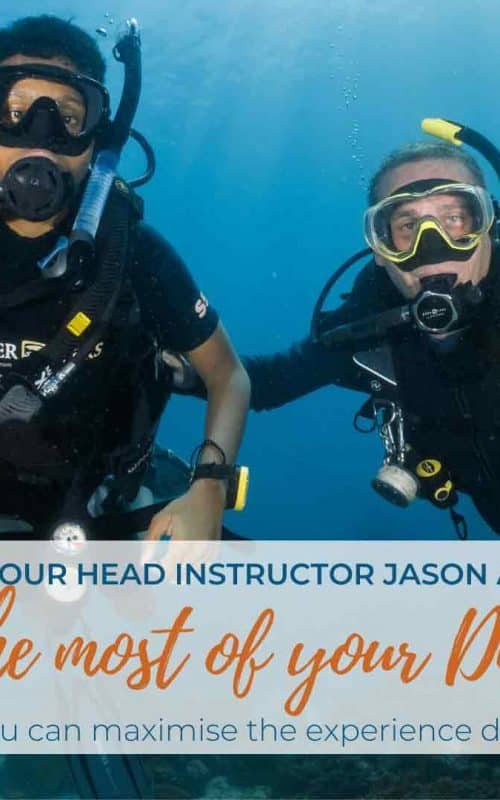At Master Divers, we pride ourselves on the quality of our training and work hard to ensure all of our divers are provided with everything they need to be safe and confident under water. However, when divers transition into being professional candidates, the balance of initiative shifts from being told exactly what to do and when, into a much more of a collaborative approach. The relationship with those teaching also changes from an instructor – student relationship to that of a candidate and mentor.
The best Divemaster Training on Koh Tao
The PADI Divemaster course is made up of several elements – knowledge development, water skills exercises, workshops, and practical skills and assessments. For a new candidate looking through the performance requirements for the first time, the list can be a little overwhelming. This is not to say new Divemaster Candidates are suddenly left to fend for themselves – far from it in fact. Here at Master Divers we have implemented some structure into our program to help ease candidates into their training and to help turn the daunting list into a set of achievable goals.
All of our DM Candidates go through a scheduled Foundation Week where much of the introductory theory is covered, longer term projects such as mapping are introduced, and candidates get their first go at professional level skill demonstrations. At the end of their training, candidates also attend a scheduled Closing Week where the final exams and assessments are carried out before signing off as a brand new PADI Divemaster!
Do you have more questions about the Divemaster course? Check out this blog post about ‘all you need to know about your PADI Divemaster’ that we published a little while ago!
Most DM Candidates stay for an extended period to train, so what exactly are you doing for the rest of the time outside of those two scheduled weeks? This is the time when you will build the bulk of your experience, develop further skills, and take part in a whole range of dive related activities. This is also the point where you as the candidate need to take the lead when it comes to your training. So what should you be doing to make sure you get the most out of your training? Here we share our “fireside” with Jason, our PADI Head Instructor and one of our Divemaster Mentors, as he shares his advice on how to make the most of the course and become the best PADI Professional you can be.

Hi Jason, thanks for taking the time for this interview. First of all, how long should DM candidates plan to be here for?
By training standards it is possible to complete a PADI Divemaster Course in 10 days, however here at Master Divers we recommend 2-3 months. This gives candidates a good amount of time to consolidate their training. It also gives them the chance to increase their dive experience. Finally, Koh Tao is a great island with lots more to do besides diving, so you would want to have time to be able to take days off when you want and explore all it has to offer.
Not all DM candidates plan to work in the industry, but for those that are looking for a career in diving, what would be your advice?
It’s true, some people choose the Divemaster program out of interest. It is the first step on the professional ladder within diving, but even for those who don’t intend to become a dive professional, it’s a great way to learn a lot about diving and to build up dive experience. Candidates with a great attitude and those who put in effort definitely stand out. Many look on their DM training as one of the best experiences of their lives, but this is not a holiday. You are entering professional level training so you should take it seriously, even if it’s seriously good fun.
If you want to work in the industry, get involved in the dive centre as much as you can and take all the opportunities for additional experiences. Seek additional Specialty course training and internship opportunities. Dive centres are generally very sociable places so immerse yourself in the social life of the dive centre. Koh Tao has several island wide clean-up activities throughout the year. If your training coincides with one of these, make sure you get involved, it’s a great way to network with other dive professionals, candidates and dive schools. Normally these events are well-supported by the training agencies, so take time then to get to know the PADI Membership Representatives who will be there to support you once you have become a fully-fledged Pro.
With so many elements to the Divemaster course, which would you say is more important? Theory or water work?
Knowledge and water skills are equally important to develop, so you should ensure you have a good balance of each in your program. Once you have your materials you should be reading ahead to have a good grounding of the content before you have your scheduled class on it. You also receive a copy of the Encyclopedia of Recreational Diving in your Divemaster pack, which is a fantastic resource to give you extra information for topics you would like to learn more about. Make sure you ask questions, and ask your instructor for additional information and resources. As a dive centre we have both a physical and a digital library of resources you can draw on while you learn. Make sure you plan time for self-study in order to take advantage of this.
We include unlimited diving during the Divemaster training. How would advise candidate to maximise this?
Of course dive dive dive! Try to dive with and assist as many courses and experiences with as many Instructors and Divemasters as you possibly can. Everyone will have their own slight differences. The more variety you can observe the more material you have to draw on to develop your own style, and you’ll always learn new hints and tips from assisting different dive leaders.
Ask the instructors about how to understand and read condition when you are out on the boat, ask about the rationale behind dive site choice and if the sites change, why so. When you are fun diving, take turns with your fellow candidates to brief and lead the dives you do. This is such a great way to develop navigation and fish ID skills.
At Master Divers, we facilitate learning on your DMC fun dives, by setting a range of micro objectives for your dives. These are based around many of the aspects you will be learning about in your training. They are wide ranging and designed to give additional focus to your group fun dives beyond simply floating around a dive site. Examples include finding and identifying a new species of marine life you have never seen before, or planning your dive and diving your plan with the RDP rather than relying on your dive computer.
Finally, if a candidate is planning to work in the industry afterwards, what will they need?
For your Divemaster program, you will, at the very least need the basic safety equipment and a dive computer. However once you are working you will not be able to borrow the remaining gear you need, so first and foremost you will need a full set of personal dive equipment. For this, you should invest in the best quality you can as you will be wearing for a good length of each day.

All dive professionals must have their own personal dive accident insurance. We include an annual policy in all of our Career and Premium Professional training packages. Although it is not a requirement by law in Thailand, we would also strongly advise all dive professionals have their own professional liability insurance.
Finally if you are coming here for an extended time, do not worry about bringing a lot of things with you. Laundry is very cheap – you drop your bag of dirty clothes off in the morning and can normally collect a neatly folded sweet smelling pile of clothes in the evening. You can buy almost everything you need day to day on Koh Tao, and now if it’s not available to buy directly here, buying online for delivery is very easy.
Thanks again, Jason, for taking the time and sharing these important points with us. We hope this interview gives you an idea on what to expect from your Divemaster Training and how to maximize your experience.
If you have any questions, don’t be shy to send us a message or contact our Head Instructor Jason under jason@master-divers.com.
Image credits: Dan Lee, private.

